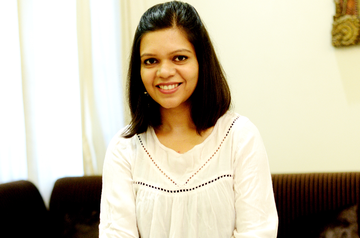Meet The SHEROES - Shikha Shah
The 27 year old Varanasi girl Shikha Shah started Scrapshala to solve the problem of waste generation. A solution which would reduce the pressure on landfills and water-bodies, and develop a public cloud-based database for waste generation for Varanasi, bringing behavioral change at consumer level with respect to mindless trashing by promoting innovation.
Shikha tells us here about her venture which has an all women leadership:
Tell us about yourself
After finishing school, I did my graduation from Hansraj College, Delhi University and post-grad in environmental studies from TERI University in New Delhi. The internships and job I had taken during and after higher studies made me travel extensively all around India with a new set of people every time and allowed me to evolve into a better person.
Working at Reliance Foundation exposed me to rural India and experience real-world problems. It was a perfect transition from academic to working life. IIT Madras introduced me to social entrepreneurship. I met many startup founders and understood the hardships and strategies of implementing an idea successfully. Experiences at both the organizations made me confident to build an idea and start my own journey of entrepreneurship.
I returned back to Varanasi in November 2015 from IIT Madras and spend two months brainstorming on an idea which got incepted as ScrapShala in January 2016.
What led you to start Scrapshala?
Spotting trash at every other corner in different parts of India is common but finding a solution that could be practiced at consumer level by any age group was exciting.
Since childhood, I had seen my mother, Madhu Shah being conscious as a consumer and re-innovating junk/unused things into better things. She was very strict in making us practice to waste least. Travelling at various places in India and internet exposed me to professional world of Upcycling.
Upcycling was a cooler term for reusing things for longer time, which was traditionally practiced in India before machine age came into picture. Landfill and recycling are the only solutions for waste management in India. Landfills were filled beyond capacity in most cities and recycling lacked infrastructure, making it inaccessible to consumer to do anything about waste.
The simplicity and ease of practicing the idea from comfort of home encouraged me to take it up professionally and generate a group of professionals who can replicate it and make it a household practice. That is when the idea of ScrapShala got incepted. India being one of the dirtiest countries in world, I believed that Scrapshala will fill a huge gap and will give employment to hundreds of skilled less-privileged professionals.
You have an all women leadership? Was it a conscious decision? If yes, why?
Since childhood, I dreamt of being an independent girl capable of taking decisions .Today, I feel proud and scared at the same time, to be able to move in the same direction.
It was not a conscious decision to have an all-women leadership team. I moved to Varanasi after nine long years and city had changed a lot. I needed to get connected to city, its problem and people. I was helped by my mother, Madhu Shah and a school friend, Kriti Singh, who eventually got interested and joined me. Three of us formed the core team and eventually few more girls joined us as interns and got interested to join the team.
Now we have a mix of boys and girls who play different roles in team. Many of them are seasonal interns. Our artisan team is also a mix of women and men. I make sure to give a chance to any women who have skills or are ready to learn some. We also work with few NGOs for providing skill training to less-privileged girls in Varanasi.
What are the challenges that you face?
Working with “scrap” was the biggest challenge and it still remains. Commercializing something made out of scrap was difficult in many ways. Making artisan work on scrap, designing the products, making family believe that it was not a disrespectable job and making clients accept the upcycled products was a struggle.
Coming from a conservative Marwari business family, it was complicated to answer why and how I would be able to pull off an unconventional idea like ScrapShala. In the world where girls at marriageable age from respectable families are expected to be polished from head to toe all day around, it was very challenging for us to pull day long public events such as awareness campaigns, cleanliness drives, workshops and exhibitions,
Our current team doesn’t have any professional designers and it becomes difficult at times to make people agree that we can still pull off a great product using our common sense. It was also difficult to convince investors to get involved with a women-led team and most common question was “what will happen once you girls get married?”
Initially I was operating out of home but since the venture revolves around scrap/junk, it was becoming difficult to do the same as venture was growing bigger. Last month, we moved to an individual space and now we have new set of challenges everyday such as sorting and storage of scrap, artisan management and innovating new products every week.
What are your plans of expansion for the next year?
The plan is to have a stable production house for upcycling in Varanasi and supply all over India for next few years
1. Strengthen the team with new people, new skill sets and good mentoring
2. Establish a reliable chain of youth volunteers/scrap donors by doing tie-ups with industries, educational institutes and residential builders
3. Increase in-house production of upcycled goods,
4. Innovation in newer categories of waste
5. Collaborate with corporates/government clients and volunteers.
.jpg )
















